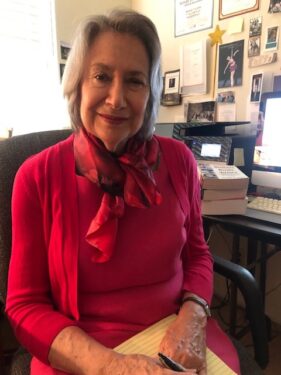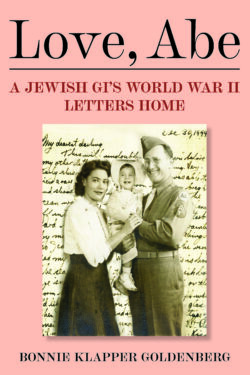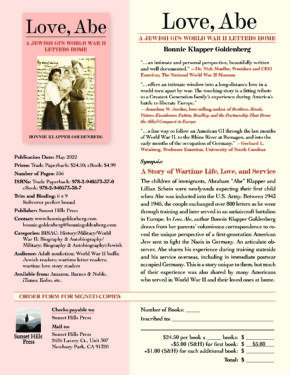 Bonnie Goldenberg’s journey into World War II history began when she was given a treasure trove of letters her parents had exchanged during her father’s service in a U.S. Army antiaircraft battalion from 1943 until 1945. Those letters became the foundation of Love, Abe: A Jewish GI’s World War II Letters Home.
Bonnie Goldenberg’s journey into World War II history began when she was given a treasure trove of letters her parents had exchanged during her father’s service in a U.S. Army antiaircraft battalion from 1943 until 1945. Those letters became the foundation of Love, Abe: A Jewish GI’s World War II Letters Home.
Goldenberg is also a poet whose works have been published in a variety of literary journals and anthologies. Before leaving her professional career to focus on raising her son, she was a labor attorney in New York and Washington, D.C., and a writer and editor for a legal publishing house in New York City.
In addition to writing, she is the business administrator of her husband’s biopharma startup. She and her husband live in Thousand Oaks, California.
Love, Abe: A Jewish GI’s World War II Letters Home
A story of wartime life, love, and service
The children of immigrants, Abraham “Abe” Klapper and Lillian Schein were newlyweds expecting their first child when Abe was inducted into the U.S. Army and later served in an antiaircraft battalion. Between 1943 and 1945, the couple exchanged over 800 letters. In Love, Abe, author Bonnie Goldenberg draws from her parents’ voluminous correspondence to reveal the unique perspective of a first-generation American Jew sent to fight the Nazis in Germany.
While contending with the vicious anti-Semitism of the Nazi regime, Abe was no stranger to prejudice on the home front. An articulate observer, he shares his experiences during training stateside and his service overseas, including:
- Celebrating Passover in Hitler’s Germany
- Joining the front line for Europe’s biggest antiaircraft battle at the bridge at Remagen
- Using his background in Yiddish to act as an interpreter with German civilians and POWs
- The elation of V-E Day and V-J Day
- Daily life in postwar occupied Germany
- Guarding the Ministerial Collecting Center as part of “Operation Goldcup” to recover documents scattered across Germany during the Allied bombing
In his letters, Abe poured out his love, hopes and dreams for his wife and young daughter and the future he was fighting for.
This is a story unique to Abe and Lillian, but much of their experience was also shared by many of the Americans who served in World War II and their loved ones at home.

